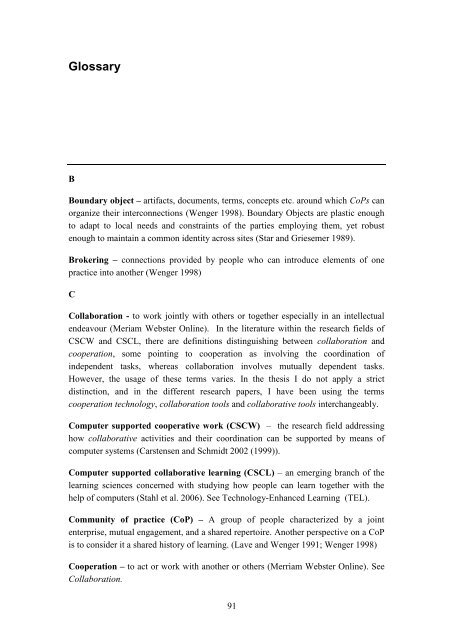The work-reflection-learning cycle - Department of Computer and ...
The work-reflection-learning cycle - Department of Computer and ...
The work-reflection-learning cycle - Department of Computer and ...
You also want an ePaper? Increase the reach of your titles
YUMPU automatically turns print PDFs into web optimized ePapers that Google loves.
Glossary<br />
B<br />
Boundary object – artifacts, documents, terms, concepts etc. around which CoPs can<br />
organize their interconnections (Wenger 1998). Boundary Objects are plastic enough<br />
to adapt to local needs <strong>and</strong> constraints <strong>of</strong> the parties employing them, yet robust<br />
enough to maintain a common identity across sites (Star <strong>and</strong> Griesemer 1989).<br />
Brokering – connections provided by people who can introduce elements <strong>of</strong> one<br />
practice into another (Wenger 1998)<br />
C<br />
Collaboration - to <strong>work</strong> jointly with others or together especially in an intellectual<br />
endeavour (Meriam Webster Online). In the literature within the research fields <strong>of</strong><br />
CSCW <strong>and</strong> CSCL, there are definitions distinguishing between collaboration <strong>and</strong><br />
cooperation, some pointing to cooperation as involving the coordination <strong>of</strong><br />
independent tasks, whereas collaboration involves mutually dependent tasks.<br />
However, the usage <strong>of</strong> these terms varies. In the thesis I do not apply a strict<br />
distinction, <strong>and</strong> in the different research papers, I have been using the terms<br />
cooperation technology, collaboration tools <strong>and</strong> collaborative tools interchangeably.<br />
<strong>Computer</strong> supported cooperative <strong>work</strong> (CSCW) – the research field addressing<br />
how collaborative activities <strong>and</strong> their coordination can be supported by means <strong>of</strong><br />
computer systems (Carstensen <strong>and</strong> Schmidt 2002 (1999)).<br />
<strong>Computer</strong> supported collaborative <strong>learning</strong> (CSCL) – an emerging branch <strong>of</strong> the<br />
<strong>learning</strong> sciences concerned with studying how people can learn together with the<br />
help <strong>of</strong> computers (Stahl et al. 2006). See Technology-Enhanced Learning (TEL).<br />
Community <strong>of</strong> practice (CoP) – A group <strong>of</strong> people characterized by a joint<br />
enterprise, mutual engagement, <strong>and</strong> a shared repertoire. Another perspective on a CoP<br />
is to consider it a shared history <strong>of</strong> <strong>learning</strong>. (Lave <strong>and</strong> Wenger 1991; Wenger 1998)<br />
Cooperation – to act or <strong>work</strong> with another or others (Merriam Webster Online). See<br />
Collaboration.<br />
91
















